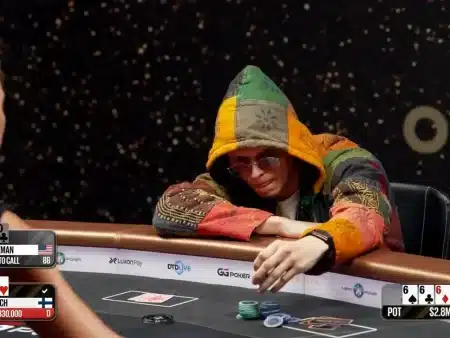Phil Ivey is widely regarded as the greatest poker player ever. His reputation comes from his uncanny reads, the way he stays cool under pressure, and how he just keeps winning at the highest stakes around.
These qualities have made him a legend in the poker world, and honestly, it’s hard to argue with that.

What really sets Ivey apart from other top players is his intense focus and how he processes so much information at once. He picks up on betting patterns, subtle tells, timing, posture—little things most folks just don’t see.
That awareness gives him a real edge, even against players using the latest poker-solving software.
Let’s look at seven hands that really show off Ivey’s brilliance. Each one highlights a different side of his game—sometimes it’s a wild read, sometimes it’s a perfectly timed bluff.
Poker pros have broken down these hands, pointing out what makes Ivey’s decisions so special, and, well, what the rest of us might actually learn from him.
Phil Ivey: Poker Legend and His Unique Playing Style

Phil Ivey is one of poker’s most intimidating players, famous for his aggressive tactics and insane reading ability.
He’s adapted to all sorts of poker formats, which is honestly pretty rare.
The Rise of Phil Ivey
Ivey’s rise started in the early 2000s. He made a name for himself fast, earning the nickname “The Tiger Woods of Poker” and racking up ten World Series of Poker bracelets.
He built his early bankroll grinding away in Atlantic City casinos. Unlike a lot of pros, Ivey found success across every type of poker—from No-Limit Hold’em to 2-7 Lowball.
He’s got millions in tournament winnings, plus a legendary reputation in high-stakes cash games. That stone-cold “Ivey stare” is famous; people say it’s impossible to read him.
Signature Strategies at the Poker Table
Ivey’s style is unpredictable and constantly evolving. Early on, he was super aggressive, always putting pressure on his opponents.
Lately, some say he’s become a bit more measured, but you never really know what he’ll do next.
His mind-reading skills are almost spooky. There are countless televised hands where he calls out exactly what his opponent is holding.
He’ll play passively for a while, then suddenly crank up the aggression. That keeps his opponents totally off-balance.
On top of all that, Ivey’s careful with his bankroll, which lets him keep playing at the biggest tables for years.
Selection Criteria: What Makes a Brilliant Poker Hand?
A brilliant poker hand isn’t just about winning. It’s a mix of strategy, psychology, and good old mathematical precision.
The best hands show a player making top-tier decisions under pressure and reading their opponent like a book.
Professional Analysis Standards
When pros analyze hands, they’re not just looking at who won. They care about the quality of the decisions, even if the cards don’t go your way sometimes.
They’ll break down bet sizing, pot odds, and whether the player squeezed out as much value as possible or managed to dodge a bullet.
Table position matters, too. How a player uses their spot at the table to their advantage is a huge deal.
Timing is another thing—sometimes a quick play or a long pause gives away more than you’d think. Ivey’s especially good at picking up on that.
And let’s not forget hand reading. Narrowing down what your opponent could have based on how they’ve played the hand so far? That’s a real skill.
Measuring Skill, Bluff, and Risk
Skill in poker shows up in consistent, mathematically solid decisions. Analysts look at how well players balance their ranges and use game theory.
Bluffs get judged on whether they make sense and if the timing is right. The best bluffs tell a believable story from start to finish.
Ivey is a master at picking just the right moment to pull the trigger, especially when the board and betting patterns back up his story.
Risk assessment is all about pot odds and equity—making the right call or fold at the right time. The best hands often show someone taking a calculated risk, weighing the cost against the possible reward.
Keeping your emotions in check when things get heated? That’s what separates the best from the rest.
The 7 Most Brilliant Poker Hands Played by Phil Ivey
Ivey’s genius is on full display in his ability to read people, time his bluffs, and squeeze every last chip out of his opponents.
His mix of strategy and psychological warfare is something most players can only dream of.
Hand #1: Masterful Bluff Against a Pro
On High Stakes Poker, Ivey pulled off a legendary bluff against Mike Matusow, aka “The Mouth.” With just 7-2 offsuit, Ivey raised pre-flop and kept firing on a board that gave him nothing.
Matusow had pocket kings—plenty strong—but he couldn’t bring himself to call. Ivey’s confidence and timing convinced him Ivey had the nuts.
After the hand, Ivey showed the bluff, and that just cemented his reputation for fearless play and insane reads.
Hand #2: Calculated Value Bet in High Stakes
Playing against Andrew Feldman in a million-dollar pot, Ivey showed his skill at value betting. He had pocket aces and played it slow, letting Feldman build the pot with top pair.
On the river, Ivey bet just enough to look suspicious, but not so much that Feldman could fold. Feldman called, thinking Ivey was bluffing.
That bet sizing was pure genius—just big enough to get paid but not so big it scared off action.
Hand #3: Perfect Timing with the Axe
Facing Tony G, Ivey played “the axe” (ace-king) with perfect timing. After a wild pre-flop raising battle, Ivey called Tony G’s all-in with ace-king against queens.
The flop brought an ace, putting Ivey ahead. He didn’t celebrate, just kept that famous poker face.
What made this hand special wasn’t just the cards—it was Ivey’s ability to get all the chips in when he had a tiny edge, especially against a player as emotional as Tony G. That’s mastery of both math and psychology.
Experts Weigh In: Pro Analysis of Each Hand
Some of the top poker pros have picked apart Ivey’s play, trying to figure out what makes him so tough to beat.
Their insights reveal a lot about his strategy, mental game, and those freakish reads under pressure.
Key Observations from Professional Players
A lot of pros talk about Ivey’s crazy ability to make spot-on reads. In one hand on Hustler Casino Live, he made a call that left the commentators speechless.
He’s also known for using position to his advantage, squeezing out extra value when he’s got the edge and cutting losses when he doesn’t.
Ivey’s bet sizing is another thing the experts love. He rarely bets the “standard” amount; it’s always tailored to the situation.
Daniel Negreanu once said, “Phil processes information faster than anyone I’ve played against. He’s already three steps ahead while others are still figuring out the current situation.” That kind of sums it up.
Psychology and Tilt Management
Ivey’s emotional control is legendary. No matter how big the pot or how bad the beat, his face barely changes.
There was a hand where he mucked what would’ve been a winner against Smith. Instead of tilting, he just moved on to the next hand.
Tom Dwan has pointed out that Ivey doesn’t let massive losses affect his play. That kind of mental strength is rare.
Most experts agree: Ivey’s ability to stay calm and focused, no matter what, gives him a huge edge over the long haul.
Avoiding Cheating Accusations
Despite his aggressive style, Ivey’s known for playing by the book. Even after the whole edge-sorting controversy, most pros still respect his integrity.
His wins come from skill, not shady tactics. Ivey’s reads and decision-making set him apart from players looking for shortcuts.
In games like those at Hustler Casino Live, he sticks to poker etiquette—no angle shooting, no funny business.
The pros suggest studying Ivey’s straightforward approach. Mastering the basics and psychology will get you further than any shortcut ever could.
Lessons for Players: What You Can Learn from Phil Ivey’s Genius
There’s a lot to pick up from Ivey’s approach—whether it’s how he manages his bankroll or his style at the table.
His habits can help turn an average player into someone nobody wants to face.
Building Your Bankroll Through Smart Decisions
Ivey didn’t get to the top by being reckless with his money. He built his bankroll slowly, always picking the right games.
One lesson? Play at stakes you can actually afford. Ivey only moved up when he was ready, so he never risked going broke on a bad run.
Emotional control is key, too. Ivey doesn’t chase losses or let his emotions drive his decisions. Win or lose, he keeps the same focus.
He also tracks his results carefully—knowing exactly how he’s doing in every game and format. That kind of discipline makes a difference.
Applying Unique Moves to Your Own Game
Ivey’s play is all about thinking beyond the usual strategies. He doesn’t just stick to formulas—he adapts, shifting his approach depending on who he’s up against.
The search results really show off Ivey’s knack for reading people. He pays close attention to his opponents, always on the lookout for patterns or little tells that might give away the strength of their hands.
This kind of skill? It comes from being laser-focused at the table, even during hands where he’s not directly involved.
Another takeaway from Ivey’s style is learning to keep your own game unpredictable. Try mixing things up now and then, maybe throw in a move or two that your opponents just won’t see coming.
Image exploitation—now that’s something Ivey handles brilliantly. Once people think they’ve figured out your style, you can use that to your advantage when it matters most.
And let’s not forget, technical know-how only gets you so far without some serious mental toughness. Ivey’s ability to stay calm and collected under pressure is just as crucial as his strategy.













